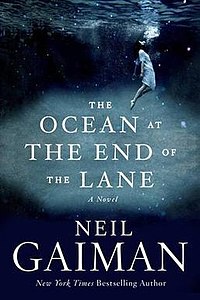
So naturally, when I found out he'd be speaking not too far from me (three hours isn't far, right?), I bought tickets.
And dragged my husband (who's read Sandman and seen Stardust so he wasn't completely reluctant) with me. (I also ran into some of my wonderful writer friends, including three of my agent-sisters! So that was fun).
The event organizers asked Doug Fabrizio, of Utah's Radio West, to interview Gaiman for the evening. He asked some good questions, though honestly I'd have been happy to listen to Gaiman rhapsodize about the phone book. (I think the interview will be broadcast on Radio West shortly).
I tried to take notes because I have a lousy memory without visual stimuli--but naturally, since the theater was dark I can only read half of what I wrote.
Some things I loved:
Gaiman on Fiction
He asked, "Are fictions safe? Should they be?"He became a writer around age twenty, after a childhood obsessed with books (and funny bookish fantasies, like slipping into an alternate reality where The Lord of the Rings hadn't been written, and his role would be to make it look like a manuscript and get it published in this alternate world so he could become known as the author of LOTR). The clincher, he said, was thinking that at the end of his life, he didn't want to think "I could have been a writer"--and not know if he was lying.
Confessing that if he wasn't a writer, he'd like to design religions.
Great art isn't forged in the crucible of suffering--you don't have to suffer to write. But if you are suffering, writing can help you transmute pain into something beautiful. (There were several poignant moments where it was clear Gaiman has been thinking about losing his sometimes writing collaborator, Terry Pratchett).
Good writers make you forget the craft for the magic.
Gaiman on life in general
Doug Fabrizio asked if Gaiman would talk about his new hobby of bee keeping. Gaiman answered, "Everyone should have a hobby that can kill them."Asked, "What are you afraid of?" Gaiman confessed to the normal things (including having his eyeballs melt while riding on a train, because of course that's normal), and then added, "I'm not scared of monsters, but of people who are certain of their own rightness."
On the differences between England and America: "England has history; America has geography."
Gaiman on the genesis of his stories
One of my favorite parts of the night was hearing how some of his stories came to be. Coraline was started in the 90s when one of his daughters would come home from kindergarten and tell him these creepy stories about a girl with her name who would come home to her mother--who wasn't her mother--and who would then lock her in the basement with all the other dead girls and boys.After discovering (not unnaturally) that the local bookstore didn't carry horror stories for five-year-olds, he started writing her a story. He abandoned it for several years before realizing his children would be grown before he finished it, if he didn't hurry.
Then, of course, he couldn't sell it to his agent. "It's too scary," she said, refusing to send it on to Harper Children's. He convinced her to read it to her own children (then ages 6 and 8). If they weren't scared, she would send it to Harper Children's. If they were scared . . . he'd pay for therapy.
It worked. The kids loved it, his agent sent it on, the editors loved it, it was published, made into a movie and even a Broadway play.
Sitting at the Broadway premier, Gaiman found himself sitting by one of his agent's daughters, then about fifteen. He said, "This happened because of you," and explained the story to her, concluding, "This happened because you weren't frightened."
"I was terrified," she said. "But I knew that if I showed it, my mom would stop reading and I'd never find out how it ended."
Gaiman concluded, "So Coraline exists because she lied."
I think it's impossible to capture the magic of that auditorium, listening to a master storyteller, in the bare words on a blog post.
But my mind is filled with words now and glimmers of stories, and that might be the very best part of all.
No comments:
Post a Comment